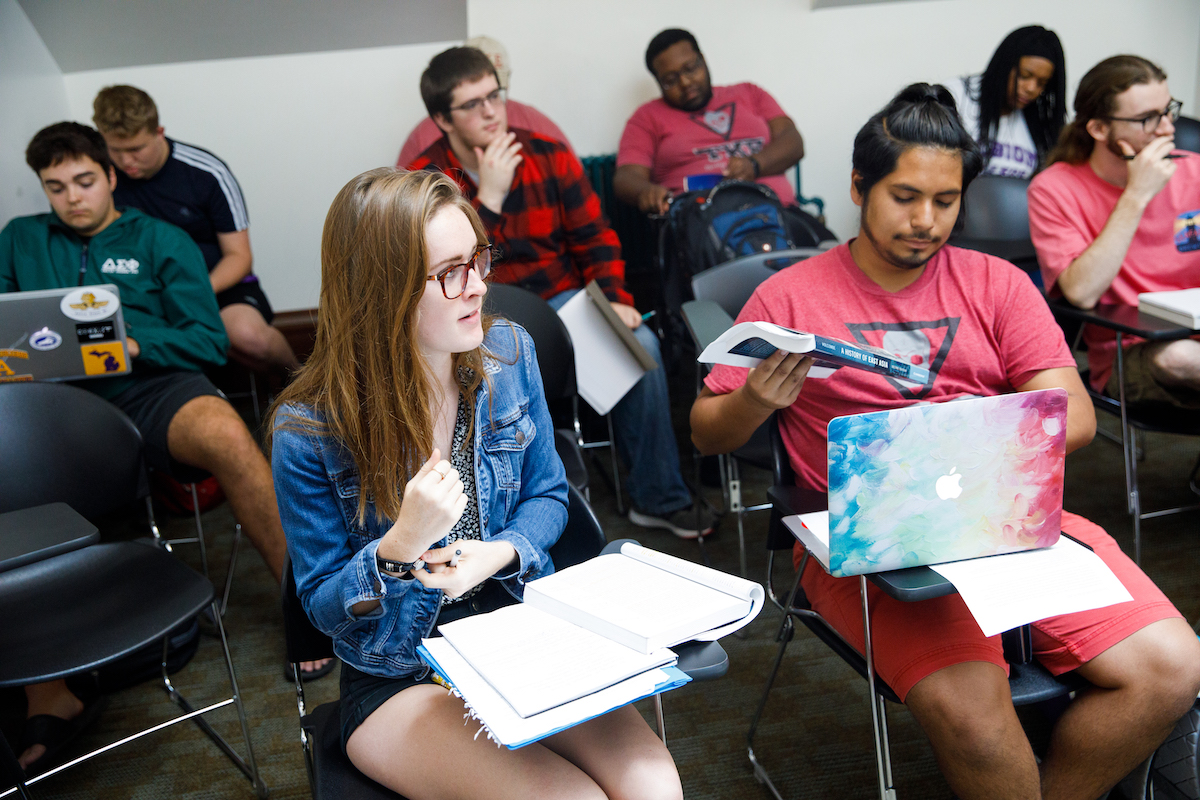Crossing the Boundary, into the Classroom
For Albion education students, it’s often a life-changing moment. During “Maemester,” they are immersed in a public school classroom full-time for three weeks to teach their own unit plan. All eyes are on them!
June 1, 2022
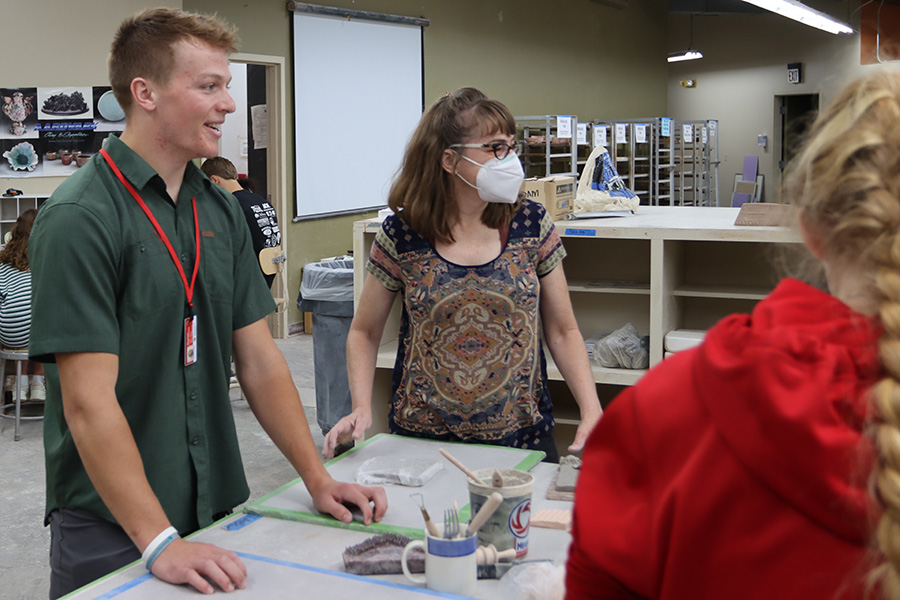
Jerry Haadsma, ’22 (left), and Albion ceramics professor Shauna Merriman work with Marshall High School students as they decorate clay tiles during a field trip to the Albion College campus.
By Ariel Berry
Last week, a bus full of 11th graders from Marshall High School pulled onto Albion’s campus. They were the students of Jerry Haadsma, ’22, a prospective teacher in Albion College’s Maemester program. Haadsma is a secondary English education major with a minor in teaching English as a second language, and is set to graduate in December following his student teaching in the fall.
Maemester is the concluding month-long experience to a course called Boundary Crossings — either EDUC 396, geared toward teaching elementary school, or EDUC 397, geared toward secondary school. The students work with mentor teachers in the public schools and teach a unit themselves during the month of May. At the end of the month, they present their projects on Albion’s campus at the Maemester Showcase Learning Fair in the Science Complex atrium.
Originally referred to as Maymester, “Maemester” has been so named in honor of Mae Ola Dunklin, the longtime Albion educator, former director of the Fritz Shurmur Center for Teacher Development and current College trustee.
The Maemester program has allowed Haadsma the opportunity to work as a prospective teacher, partnering with mentor teacher Mike Fitzpatrick. Haadsma arranged the field trip so that students could work with Shauna Merriman, assistant professor of art and art history, in the ceramics studio. “This is a day I’ve been thinking about for the last three months, so the fact that it’s here and we’re finally doing it is really, really cool,” Haadsma said.
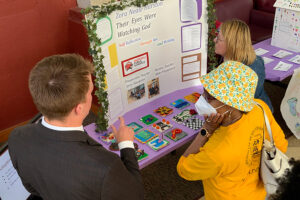
Haadsma talks about his students’ finished tiles with Albion College trustee and retired Albion educator Mae Ola Dunklin at the Maemester Showcase Learning Fair May 26.
“We are currently reading, and about to finish, Zora Neale Hurston’s Their Eyes Were Watching God,” Haadsma said, and the book’s main character takes a long time to “figure out what she wants out of her life, so [there’s] this idea of self-realization, self-reflection. I thought it’d be kind of cool to think about the pandemic, since a lot of these kids started high school or were in their first year of high school when it started,” he said.
The Marshall High students created clay tiles that expressed their coping strategies during the pandemic, guiding them in the sort of self-reflection they were learning about in their reading. One student, who is learning Chinese, wrote Chinese characters onto his tile. Another crafted a flower, practicing new ceramics techniques that Merriman demonstrated.
These are the kinds of projects that Maemester facilitates. Prospective teachers learn and grow as instructors, and K-12 students benefit from field trips, collaborative learning and special themed projects. This year, Albion’s prospective teachers took the theme of community engagement and incorporated material from their major and minor, resulting in projects teaching everything from origami, to fairy tales from different countries, to 3D printing.
A Sustainable Program
The faculty for Boundary Crossings, Dr. Suellyn Henke and Dr. Betty Okwako-Riekkola, venture into the schools every day to observe and coach. Henke has taught the program since its inception, and Okwako-Riekkola has participated for four years. This is the program’s 16th year running. “That’s something I’m really proud of, for all of us. It’s been a sustainable program,” Henke says. “It’s not sort of a fly-by-night thing; it’s something that continues to grow and develop and adapt.”
There are 11 Albion students in each class. As part of the process, the students create a budget and request materials for their units. The funding for Maemester comes from the Shurmur Center and from the Endowed Teacher Enhancement Fund, a generous gift from C. Robert, ’63, and Sara Maxfield, ’64, which aims to make important, enriching experiences possible for the world’s future teachers.
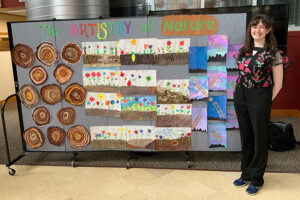
Sarah Stockton, ’23, displays her Harrington Elementary students’ work exploring “The Artistry of Nature.”
Henke says it’s exciting for her “to see the prospective teacher’s growth and that they see how we have to be accountable to so many.” Seeing students meet the challenges ahead of them with grace and poise is meaningful, she says, and she loves “to see them rise up as teachers and develop their teaching voice and develop their teaching perspectives. They always start out very compassionate, but to see that in action and hear them advocate for their students wanting the best outcomes for them, and seeing their dedication” is special, Henke says.
Okwako-Riekkola agrees that growth is an important part of Maemester. “To see them in front of the students, teaching their units and showcasing the lessons they have learned between January and April,” is important, she says. Maemester is “usually really challenging, because it’s their first immersive experience. So they’re really anxious in the beginning; they are scared, they’re uncertain, and just to see it all come together in front of the kids, and the relationships that they’ve built throughout the four months — to see it all come together, for me that’s a high moment,” she says.
Another Maemester reward that has been building in recent years is the program’s legacy component.
“Something that is also really beautiful and meaningful this year is that we have mentor teachers in Maemester whom Betty has taught [in the Boundary Crossings class], and now they’re teaching in local public schools and now they’re also supporting the program,” Henke says. “That is so rewarding to see them thriving and to see them sharing their professional expertise with the next generation.”
Teachers who took Boundary Crossings as an Albion College student are uniquely suited to serve as Maemester mentors, Okwako-Riekkola says. “Maemester has so many nuts and bolts, and sometimes a [prospective] teacher takes a while to get into the flow, but it’s so rewarding to see somebody who’s gone through it and understands and can actually direct and guide their mentees in ways that others may not,” she says.
The Showcase
The culmination of a spring semester of hard work, including a month in the field, is the Maemester Showcase, coordinated by Shurmur Center Liaison Karen Hoaglin. At the event, which this year was May 26, Albion Maemester participants present the work their students have been doing all month. Many of the K-12 students and their families attend to support their prospective teachers, and Hoaglin says her favorite part of the Showcase is “seeing the children show their projects to their families.”
Okwako-Riekkola agrees. “To see the pride and joy in [my students’] faces when their students and their families come in to celebrate the day, that’s also a great moment for me,” she says.
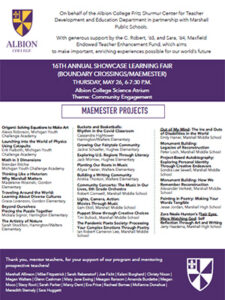
Flyers were distributed at a Marshall School Board meeting and elsewhere in the community to promote the students’ work and the Showcase event. Click for info about the prospective-teaching projects.
This year’s Showcase was a resounding success. And while it focused on their teaching, the prospective teachers were keenly aware of their own learning during the experience.
“One of the biggest things I learned was how to create a timeline for a project, and then blow it up. Students work at completely different [paces] from each other and I didn’t expect that,” says Ian Lee, ’23, of his work with English students at Marshall Middle School.
Several of the prospective teachers had similar experiences with time management, and Lee’s students all did complete their projects. Lee was alone, however, in one aspect of the experience. “Maemester was actually what made me want to do teaching in the first place,” says Lee, who participated in the program several times as an Albion Public Schools and Marshall Public Schools student. “I had great prospective teachers as a kid, and doing Maemester now has only solidified that desire to be a teacher, too.”
“When our challenging child went up and gave her a hug, that was a great feeling,” says Harrington Elementary teacher Racheal Barnes of prospective teacher Mickala Signor, ’22. It was a gesture that perhaps said more than the Young Fives student could articulate, and Signor was thrilled with the message. “When I understood what this meant, I thought, ‘I’m doing something here,’” she says. “I want to keep doing what I’m doing. I’d love to come back to Harrington. I’ve loved every minute of it.”
“I am a band and choir guy and I had very little experience with string players,” explained Robert Cornwell, ’23, who worked with Marshall’s eighth grade orchestra. “Maemester opened my eyes to this new side of music, and the kids taught me so much. That’s made me even more excited about teaching. Helping to instill this passion for something we all have a mutual love for, that’s amazing.”
Albion alumnae McKenna Donahue, ’18, and Megan Moco, ’19, were excited for the opportunity to give back as Maemester mentor teachers. “In three weeks, we’ve seen how much the [prospective teachers] have grown from this experience,” says Donahue. Adds Moco: “When I see the prospective teachers using our language, or I give them a comment and I see them acting on it the next day, I realize we’re making a difference. And in the last few days, seeing them have fun with students — that’s some of what McKenna is talking about. This can be a very stressful experience, and it can take some time before the prospective teachers feel they can relax.”
Dunklin is still a little surprised that she’s now the namesake of Maemester – but also admits that when she hears the word, it’s not herself or her name that first comes to mind. “To have something named after you that you know is going to prepare teachers to work with children — the thing that you love — I can’t describe that. I’m so proud and honored,” she says.
Each Showcase is an occasion for Dunklin to reflect on the longevity and success of a program that has surpassed her original goals, going back to her time as Shurmur Center director. “When we started this journey, we were looking for a way to involve prospective teachers with the schools. We did not anticipate this,” she says. “Providing this foundation for prospective teachers is very important, and I’m so grateful we have the support to do this.”
Henke suggests the continuing success of Boundary Crossings and Maemester is indicative of something bigger, of what the art and science of teaching is all about.
“There’s just something so authentic about being able to have this partnership with our local schools, and to see the type of mentoring that our students receive in the field from teachers and administrators,” Henke says. “They really are embraced into the profession, in learning the craft of teaching, in such a meaningful way that when I look back I always think, ‘Oh, I wish I would have had this.’ I hope that they enter into the field with confidence and a sense of joy in what they’re doing.”
Jake Weber contributed to this story.
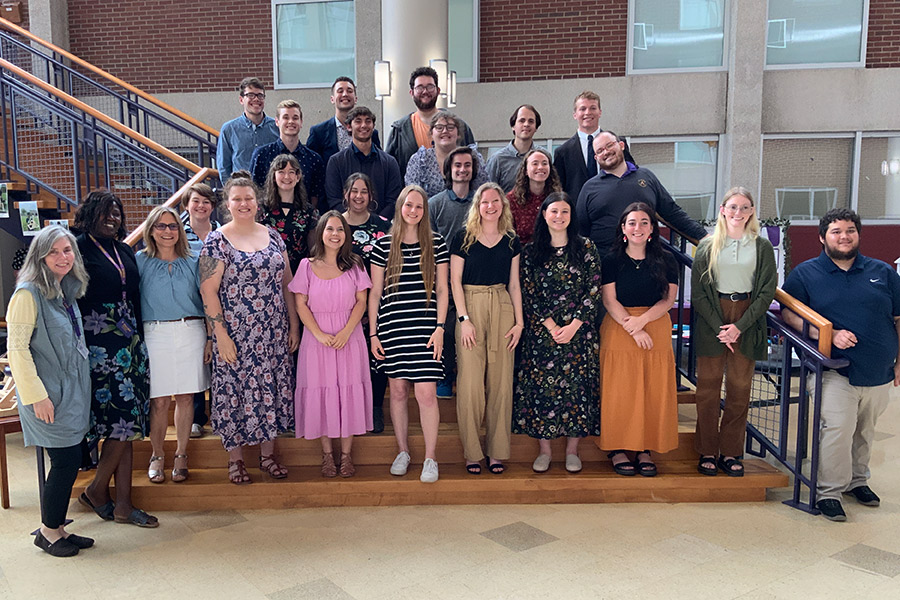
Participants in the 2022 Boundary Crossings course celebrated their shared experience at the May 26 Maemester Showcase. Front (bottom) row, left to right: Education Department faculty Suellyn Henke and Betty Okwako-Riekkola; Shurmur Center liaison Karen Hoaglin; students Cassandra Hightower, Sondra Sewell, Jacqulyn Schaefer, Anikka Thorson, Madeleine Wosinski, Grace Lorenzoni, Allysa Frazier and Alex Verkest. Second row, left to right: Students Mickala Signor, Sarah Stockton, Samantha Etoll, Timothy Bullock, Alexis Robinson and Ian Lee. Third row, left to right: Students Erik Halboth, Peter Loch, Emily Hainer, Jesse Jordan and Jerry Haadsma. Back (top) row, left to right: Students Jack Morrow, Brendan Ritchie and Robert Cornwell.
